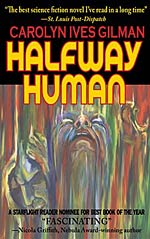
![]() tintmylf
tintmylf
4/9/2013
![]()
Halfway Human is a story about a society which has done away with sexism, racism, caste and class structure, by creating a new group of asexual androgynous individuals who are the new focus of sexism, racism, caste, and class discrimination. The story is mostly focused on a particular neutered individual (colloquial known as a bland) named Tedla who has escaped her home planet and culture into a different "enlightened" society without her homeland's biases. Most of the story is told in flashbacks about Tedla growing up and how she came to be in the predicament with which the book begins. To be certain, nothing is as rosy as it is made out.
The story is quite interesting, if moderately predictable at times. The clash of cultures and the descent from the seemingly perfect society to the dark underbelly of the reality is paced fairly well.
One of the complicating factors is that I found it almost impossible to view Tedla as an asexual androgyne and instead mentally viewed it as a "her" for the most part. Some of this is undoubtedly to my own lack of a proper mental reference frame to have an otherwise human character without gender, but part of it may be a failure (or perhaps, less harshly, acknowledge the great difficulty) of the author to be able to write truly genderless characters. Interestingly, it doesn't seem to be a general reaction to the blands: as I think back about other blands in the story, most of them struck me as more "male" in the writing. Why this is so is not entirely clear to me. Part, perhaps, is that Tedla is frequently described as particularly beautiful, a term which we generally reserve for women (or children). Also, virtually all of the characters for whom Tedla develops affection or who show it a large degree of affection (or lust) in return (while on its own planet, at least) are male, and my own cultural heterosexual biases likely translate this to viewing Tedla along more of a female axis. The latter cannot completely explain my mental reaction, however, because I had this impression almost from the beginning of the story, before the later plot developments could bias my thinking.
In some sense, I found the under-explored foreground culture almost more interesting than that where Tedla grew up and where most of the story takes place. The problems and complications of a society with a completely information-based economy could easily be the focus of a tale in and of itself, and many of the factors ring particularly true today where we are having cultural clashes and arguments about things like privacy, Wikileaks, freedom of information, and open access publishing in academia.
Overall an enjoyable book. It is not perfect in its writing or pacing, but it works and delivers on its core message and concepts. What more can one ask?